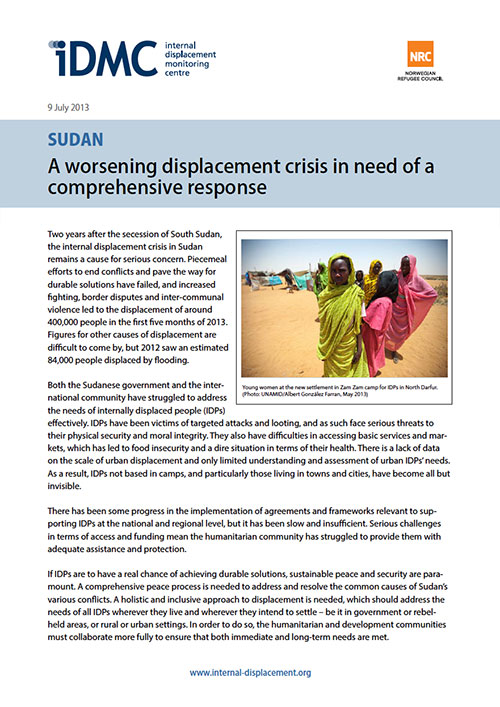Publication
09 July 2013
Sudan: A worsening displacement crisis in need of a comprehensive response

Two years after the secession of South Sudan, the internal displacement crisis in Sudan remains a cause for serious concern. Piecemeal efforts to end conflicts and pave the way for durable solutions have failed, and increased fighting, border disputes and inter-communal violence led to the displacement of around 400,000 people in the first five months of 2013. Figures for other causes of displacement are difficult to come by, but 2012 saw an estimated 84,000 people displaced by flooding.
Both the Sudanese government and the international community have struggled to address the needs of internally displaced people (IDPs) effectively. IDPs have been victims of targeted attacks and looting, and as such face serious threats to their physical security and moral integrity. They also have difficulties in accessing basic services and markets, which has led to food insecurity and a dire situation in terms of their health. There is a lack of data on the scale of urban displacement and only limited understanding and assessment of urban IDPs’ needs. As a result, IDPs not based in camps, and particularly those living in towns and cities, have become all but invisible.
There has been some progress in the implementation of agreements and frameworks relevant to supporting IDPs at the national and regional level, but it has been slow and insufficient. Serious challenges in terms of access and funding mean the humanitarian community has struggled to provide them with adequate assistance and protection.
If IDPs are to have a real chance of achieving durable solutions, sustainable peace and security are paramount. A comprehensive peace process is needed to address and resolve the common causes of Sudan’s various conflicts. A holistic and inclusive approach to displacement is needed, which should address the needs of all IDPs wherever they live and wherever they intend to settle – be it in government or rebel-held areas, or rural or urban settings. In order to do so, the humanitarian and development communities must collaborate more fully to ensure that both immediate and long-term needs are met.